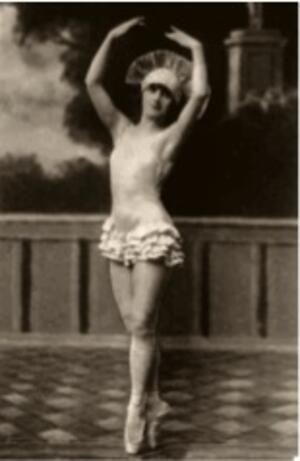The Indomitable Jewish Ballerina Who Inspired a Timeless Love Song
In 1944, at the height of the worst carnage the world has known, a mother in Budapest, Hungary, put her only son, then seven years old, out on the street with a pillow, a last morsel of bread, and the boy’s baptismal certificate. The mother was Jewish, the son Catholic.
Fifty years later the son, Cesare Frustaci—by that time an American citizen with a family of his own—contributed a video-taped oral history to Yale University and then sent the tape to author Germaine Shames. It told the story of his mother, ballerina Margit Wolf, who was banished from the stage by Mussolini only to inspire a timeless love song and then fade from history without a trace.
Margit was born in 1910 and began her ballet training at the Hungarian State Opera at the age of four. In 1928, a young ballerina of preternatural determination and discipline, she set off, along with three other dancers, including the legendary Karola Szalai, for Italy, where she was promised an audition at La Scala.
The audition never materialized, and the young ballerinas found themselves dancing in music halls alongside popular artists touring as part of Italy’s then vibrant musical theater. Margit soon met the up-and-coming Neapolitan conductor/composer Pasquale Frustaci, who would become her husband and the father of her only child. While the couple scrambled fto gain a toehold in the increasingly fascist-regulated entertainment industry, Europe seethed beneath the surface with old enmities. As Mussolini and Hitler spun a twisted alliance, Italy’s racial policies became more severe until, in 1938, all foreign Jews were given six months to leave the country. In October of that year, Margit took their two-year-old son Cesare and returned to Budapest. Pasquale, alone and heartsick, wrote the love song that would bring him international fame: Tu solamente tu.
The song, first recorded by Vittorio de Sica in 1939, catapulted to the top of the Hit Parade and earned its composer the moniker “the Italian Cole Porter.” The German version, “Du Immer Wieder Du,” would be performed by Zarah Leander, the foremost film star of the German Reich, and its English counterpart, “You, Fascinating You,” by Glenn Miller's Army Air Force Band.
In one of history’s tragic ironies, while all Europe sang of the composer’s lost love, Margit herself fought to survive in a series of concentration camps. Marched on foot from Hungary to Germany, she saved a friend’s life by concealing her in a passing cart packed with coal. Her own attempt at escape failed, and she was recaptured and incarcerated in the infamous Tent at Ravensbrück, where thousands of Hungarian Jewish women froze and starved to death.
Twenty-two years would pass before the ballerina and her maestro again met face-to-face.
Learn more about author Germaine Shames by visiting her website, listening to her read from the book, You, Fascinating You, and discuss the real life protaganist Margit Wolf. You, Fascinating You is available from Pale Fire Press and major online retailers.









